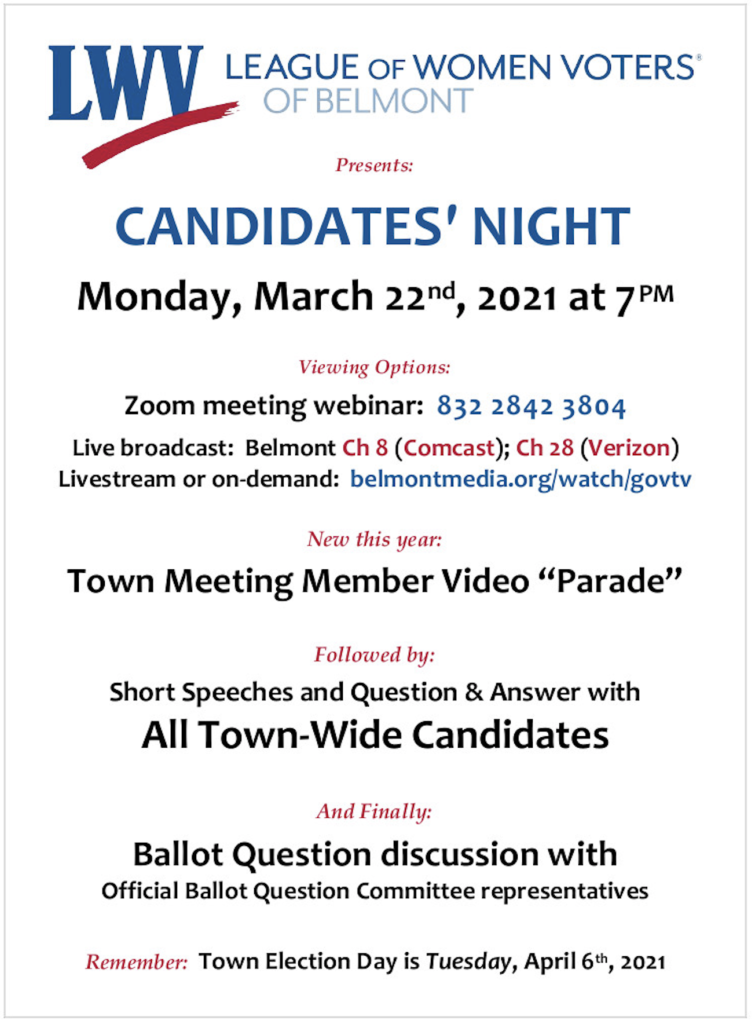Photo: A No vote sign in Cushing Square.
To the editor:
Belmont voters deserve more consideration, more respect, and far more effort from their municipal leadership and school department than they have been shown in the orchestrated push for a $6.4 million Proposition 2 1/2 override.
Drastic financial measures like a massive tax increase should always be preceded by an exhaustive and comprehensive effort to find savings, adjust priorities, defer expenses, cut costs and make other real attempts at emergency belt-tightening. This is especially true in times of great crisis – such as the global public health disaster of COVID-19. Yet there has been no evidence of such an effort in any of the official override presentations by the Select Board, Town Administrator, Superintendent, and School Department.
Furthermore, a series of significant cash windfalls are being disregarded by town officials – even though the town’s actual FY 2022 budget shortfall could easily be covered by funds either already on hand or on the way to Belmont from state and federal relief appropriations.
Here’s what override proponents want voters to either forget or ignore:
- The proposed $6.4 million tax override is almost $700,000 more than the actual budget shortfall for the fiscal year 2022. If you count the reserve funds already built into the town’s budget forecast, it is almost $3 million more than the true shortfall.
- Belmont has approximately $11.2 million in cash reserves on hand – enough to easily cover the budget shortfall and still have a robust emergency fund.
- Gov. Baker’s proposed ‘House 1’ budget includes an increase in unrestricted aid to cities and towns that will provide additional funding to Belmont. But the town administrator has acknowledged that those funds – enough to save at least one teaching or other position – were not included in the FY 22 budget calculations.
- Belmont’s state senator – one of the highest-ranking members of leadership on Beacon Hill – has explicitly said the town will receive even more state funding than Baker has proposed.
- A $1.7 trillion rescue package approved by Congress and President Biden will deliver as much as $8.6 million in semi-restricted bailout funds to Belmont. This was disclosed on March 11. Yet just days later members of the Select Board, School Department, and others advocating the massive tax increase attempted to downplay the significance of this tremendous windfall.
Across the U.S. in public, private and non-profit sectors – operating budgets have been reduced as a result of COVID-19 impact or other financial challenges. Many Americans and many Belmontians took pay cuts or worse in 2020 as employers made adjustments to keep things going. But no such measures have been suggested or proposed as part of the official plan to manage FY 22’s shortfall.
Is it possible to cut our way to fully addressing a budget deficit? No. Certainly not. But should every step be taken to reduce costs and increase efficiencies before asking voters for a massive tax increase? It seems like a reasonable ask. When voters are told there is no place to find savings – even as a simple, good-faith effort at austerity – it is not an honest statement. If upper management salaries are untouched; if temporary furloughs are not explored; if proposed hiring increases are not curtailed or suspended; if costly consulting and legal fees for pension fund management and other functions are not re-examined; then the town’s leadership has not explored every option to show good faith to the voters.
What Belmont has experienced is a series of threats: to cut jobs and fire teachers and end services. This approach was vividly on display at an override presentation some weeks ago. “Last in, first out” was the term the superintendent used to whimsically describe how teachers will be let go if Belmont “fails” to approve the override.
The doomsday school scenario – in which we are warned that Belmont education will decline terribly without this override – ignores a very obvious reality: we have already struck the bottom when it comes to educating our kids in Belmont. The pandemic inflicted historically difficult circumstances on this and every other town. We have responded how we have responded, and the results are there for everyone to see. Even if our approach to pandemic-era schooling was the best of the best, we would still be at the lowest point possible for our public education. There is only one way to go: and that is up.
Either way, let’s remember something: Belmont HAS the money to cover the shortfall even without a dime of cost-cutting by town departments. What might have been a credible discussion for some people weeks ago, now makes no sense in light of the huge bailout package approved by Congress and signed into law and the promise of more state aid.
The number of people in Belmont who cannot withstand this proposed tax increase without serious pain is nothing to ignore. Yet many are willing to dismiss that pain and what it means for those households.
How can a community that considers itself welcoming to and encouraging to and celebratory of diversity make a decision that will inflict so much damage on households from diverse economic backgrounds? This community exists today – as it always has – to welcome people from all economic circumstances. It does not exist only for the wealthy or people of means who see a $10,000, $12,000, or $14,000 tax bill as simply a convenient alternative to $50,000 in private school tuition.
The bottom line is that a vote for the override is a hostile act against people who cherish this community and want to continue living here but cannot afford a massive tax increase.
Cosmo Macero Jr., Palfrey Road, Town Meeting Member Precinct 5
